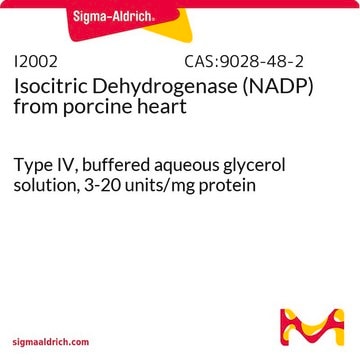SAE0052
Chitotriosidase human
recombinant, expressed in HEK 293 cells
Sinónimos:
Chitinase-1, Chitotriosidase-1
Iniciar sesiónpara Ver la Fijación de precios por contrato y de la organización
About This Item
Productos recomendados
recombinante
expressed in HEK 293 cells
Nivel de calidad
Ensayo
98% (SDS-PAGE)
Formulario
lyophilized powder
actividad específica
≥15,000 units/μg protein
mol peso
50 kDa
Condiciones de envío
ambient
temp. de almacenamiento
−20°C
Descripción general
Chitotriosidase (CT) is a human chitinase with catalytic activity upon the substrate chitin, a polymer of ?-1,4-N-acetylglucosamine. The mature CT consists of 445 amino acids, and contains a potential N-glycosylation site as well as three intrachain disulfide bonds.
Aplicación
The enzymatic activity of recombinant human CT is measured by its ability to hydrolyze the substrate 4-Methylumbelliferyl beta -D-N,N′,N”-triacetylchitotriose (Cat. # M5639). This enzymatic hydrolysis releases 4-methylumbelliferone (4MU), which upon ionization in basic pH, can be measured fluorimetrically at an excitation wavelength of 340 nm and an emission wavelength of 465 nm. The use of fluorimetric substrates provides a very sensitive detection system.
Acciones bioquímicas o fisiológicas
CT is currently the most reliable biomarker in Gaucher disease - serum and plasma CT activity is usually measured as the first step in diagnosis of Gaucher disease. Monitoring chitotriosidase activity is widely used during treatment of this pathology by enzyme replacement therapy. Its elevated plasma level reflects gradual intralysosomal accumulation in Gaucher cells (lipid-loaded macrophages). Macrophages overloaded by the enzyme accumulated in lysosomal material (lipids) were shown to secrete chitotriosidase; its increased expression was noted in several lysosomal storage diseases and atherosclerosis.
Secuencia
AKLVCYFTNWAQYRQGEARFLPKDLDPSLCTHLIYAFAGMTNHQLSTTEWNDETLYQEFNGLKKMNPKLKTLLAIGGWNFGTQKFTDMVATANNRQTFVNSAIRFLRKYSFDGLDLDWEYPGSQGSPAVDKERFTTLVQDLANAFQQEAQTSGKERLLLSAAVPAGQTYVDAGYEVDKIAQNLDFVNLMAYDFHGSWEKVTGHNSPLYKRQEESGAAASLNVDAAVQQWLQKGTPASKLILGMPTYGRSFTLASSSDTRVGAPATGSGTPGPFTKEGGMLAYYEVCSWKGATKQRIQDQKVPYIFRDNQWVGFDDVESFKTKVSYLKQKGLGGAMVWALDLDDFAGFSCNQGRYPLIQTLRQELSLPYLPSGTPELEVPKPGQPSEPEHGPSPGQDTFCQGKADGLYPNPRERSSFYSCAAGRLFQQSCPTGLVFSNSCKCCTWNGHHHHHHHHGQ
Definición de unidad
One unit is defined as the amount of CT required to produce 1 pmol of 4-Methylumbelliferone from 4-Methylumbelliferyl beta -D-
N′,N”-triacetylchitotrioside per minute at 25 °C, pH 5.6.
N′,N”-triacetylchitotrioside per minute at 25 °C, pH 5.6.
Forma física
Supplied as a lyophilized powder containing phosphate buffered saline
Código de clase de almacenamiento
10 - Combustible liquids
Clase de riesgo para el agua (WGK)
WGK 1
Punto de inflamabilidad (°F)
Not applicable
Punto de inflamabilidad (°C)
Not applicable
Elija entre una de las versiones más recientes:
Certificados de análisis (COA)
Lot/Batch Number
¿No ve la versión correcta?
Si necesita una versión concreta, puede buscar un certificado específico por el número de lote.
¿Ya tiene este producto?
Encuentre la documentación para los productos que ha comprado recientemente en la Biblioteca de documentos.
Zhi Liao et al.
PloS one, 14(7), e0219699-e0219699 (2019-07-20)
For understanding the structural characteristics and the proteome of Perna shell, the microstructure, polymorph, and protein composition of the adult Perna viridis shell were investigated. The P. viridis shell have two distinct mineral layers, myostracum and nacre, with the same
Nuestro equipo de científicos tiene experiencia en todas las áreas de investigación: Ciencias de la vida, Ciencia de los materiales, Síntesis química, Cromatografía, Analítica y muchas otras.
Póngase en contacto con el Servicio técnico







